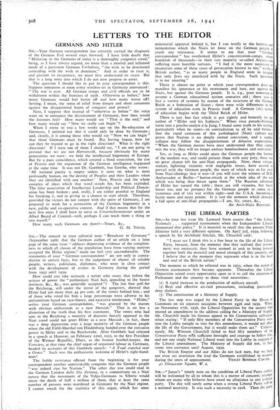LETTERS TO THE EDITOR
GERMANS AND HITLER
Slit,—Your German correspondent has certainly carried the diagnosis of the German Evil several steps forward. I have little doubt that " Hitlerism to the Germans of today is a thoroughly congenial creed," being, as I have always argued, no more than a morbid and inflamed modes of a persistent German Verhaltnis, " the wish to be dominated coinciding with the wish to dominate." And in order to treat it, and prevent its recurrence, we must first understand its cause. But that is a long story into which I do not now propose to enter.
The question I should like to put to your correspondent is this. Suppose tomorrow at noon every wireless-set in Germany announced: " The war is over. All German troops and civil officials are to be withdrawn within the frontiers of 1938. Otherwise as before," how many Germans would feel better off and how many worse off? Setting, I mean, the sense of relief from danger and short commons against the disappointed hopes of conquest and power?
Next, I suppose that instead of " otherwise as before " the voice went on to announce the disarmament of Germany, how then would the listeners feel? How many would say "That is the end," and how many would say " Now we really can begin "?
When I wrote to you a few weeks ago on the Re-education of Germany, I pointed out that it could only be done by Germans ; and, clearly, it is among those who would say " Now we can begin " that those Germans must be found. But having begun, how far can they be trusted to go in the right direction? What is the right direction? If I were one of them I should say, " I am not going to pretend that we are not Herrenvolk, because obviously for many generations we were: we held the intellectual hegemony of Europe. But by a pure coincidence, which created a fixed association, the rise of Prussia and the expansion of the German intelligence happened at the same time. It was not Dr. Goebbels, but Goethe, who wrote: ' All national poetry is empty unless it rests on what is most profoundly human, on the destiny of Peoples and their Leaders when they are identified with one another.' Now, Prussia and the whole complex of ideas which that word stands for, has been exploded. The false association of Intellectual Leadership and Political Domin- ation has been broken ; and, really, I am rather grateful to England for breaking it, and so giving us a chance to start afresh. Therefore, provided the victors do not tamper with the unity of Germany, I am prepared to work for a restoration of the German hegemony in a new, paCific and co-operative context. And if that means that for the next five years I shall have to serve as Unterrichtsminister under an Allied Board of Control—well, perhaps I can teach them a thing or two myself."
How many such Germans are there?—Yours, &c., G. M. YOUNG.


























 Previous page
Previous page